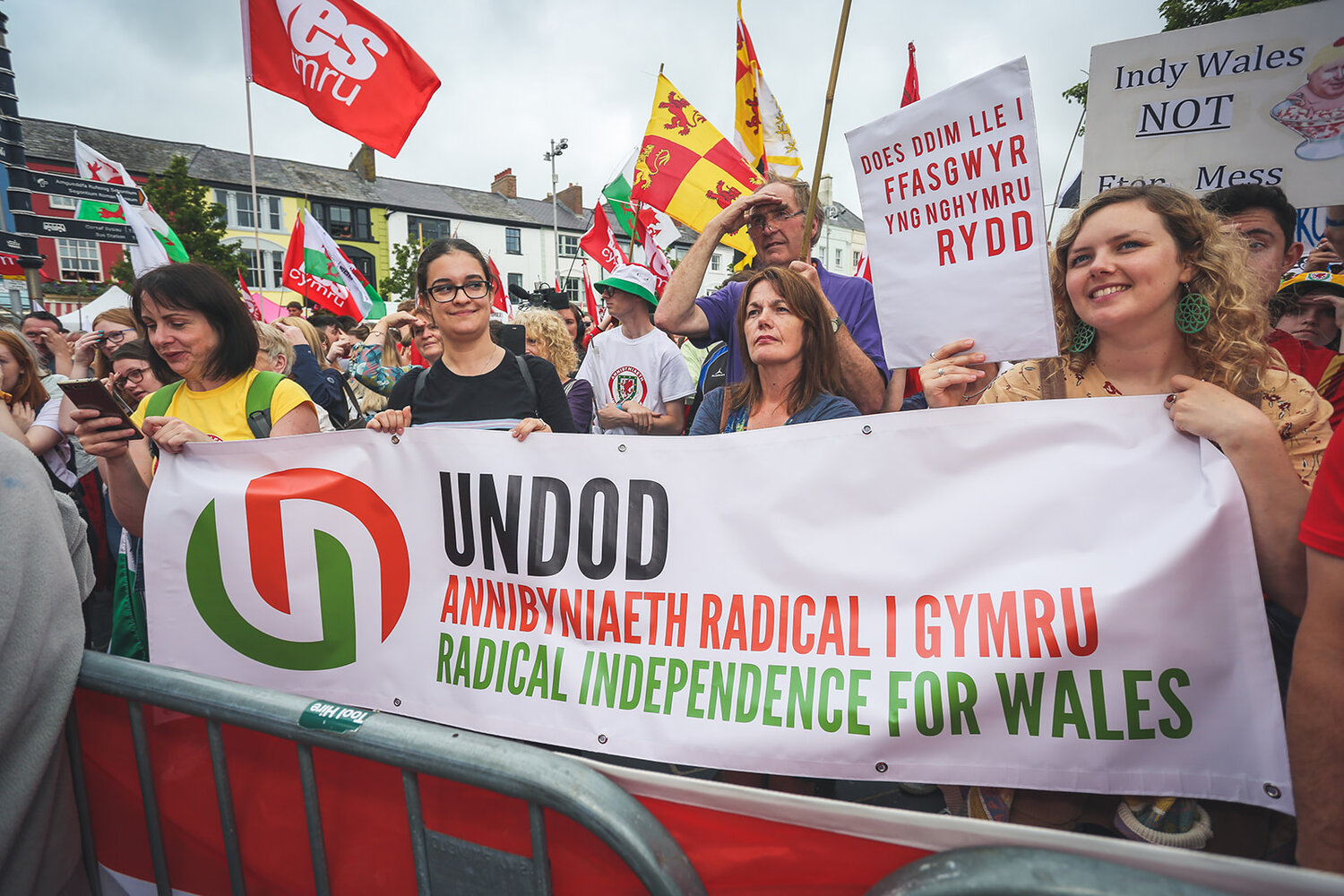
Surge for Welsh Independence Brings Hope for the Future & Challenges Ahead
ANGER AT BORIS JOHNSON’S DISASTROUS RESPONSE TO THE PANDEMIC HAS FUELLED SUPPORT FOR WELSH INDEPENDENCE
PEOPLE WANT CHANGE FROM THE STATUS QUO AFTER A DECADE OF AUSTERITY AND SYSTEMIC FAILURES BROUGHT TO THE FORE BY THE BLACK LIVES MATTER MOVEMENT
THE BIGGEST ORGANISATION CAMPAIGNING FOR INDEPENDENCE, YESCYMRU, HAS FACED CALLS TO BE MORE REPRESENTATIVE OF WALES’ BLACK, ASIAN & ETHNIC MINORITY COMMUNITIES AND STRATEGIC CHALLENGES LIE AHEAD.
Welsh independence campaigners march in Caernarfon last year. Photo credit: ffotoNant. By Jane Phillips & SC Cook.
When it became clear how devastating Covid-19 was going to be in the UK, as Boris Jonhson’s government refused to lockdown at the end of February, the care home Shaun works in took their own course of action and completely closed down to visitors. This has meant that there have been no deaths among the elderly people he looks after.
This had a profound impact on Shaun and spurred a desire for Welsh Independence, making him see first hand how many lives could have been saved had Welsh Government defied Boris Johnson’s when he chose to prioritise the economy and delay enforcing a nationwide lockdown.
“The life of a human being is greater than any amount of money,” says Shaun. “We can rebuild an economy but we can’t bring back to life those who have tragically lost their lives.”
“An independent Welsh government,” he believes, “would’ve put people before money and lives would have been saved.”
The question of putting people before profit is central to Shaun when thinking about Welsh Independence.
“We can’t go any longer being dictated to by the Conservative government in Westminster, who do not care for the working-class people in Wales. We need radical change in Wales, and we need it fast.”
In the wake of what many see as Westminster’s catastrophic failure at handling the Coronavirus pandemic, more people in Wales are questioning Wales’ right to self-determination, as a surge in support for independence has taken the movement from the fringes to the mainstream.
Whether becoming ‘indy curious’, or fully signing up to independence, support for the movement is gaining momentum.
The results of a YouGov survey for ITV Wales and Cardiff University published at the beginning of June showed 25% of people in Wales backed independence, a 4% increase from the previous survey in January. In recent years tens of thousands of people, from Caernarfon to Merthyr, have marched across Wales for Independence in demonstrations called by the All Under One Banner coalition.
The biggest organisation campaigning for Independence, YesCymru, has now seen a surge in membership in the last two months, with 2,500 new sign-ups since the beginning of May, surpassing their own target to double membership this years.
According to YesCymru Chair Siôn Jobbins, the current crisis has fed into a growing appetite for Independence. “Covid has, for one, shown what the Welsh parliament can do, and it can be for the better. It’s shown that following Westminster is not always a good thing,” he says as we speak over the phone at the beginning of June.
“The big change for us was when the Welsh Government decided to stick with the stay-at-home message with Scotland and Northern Ireland and then Westminster diverged from that.”
Shortly after this, the scandal surrounding Dominic Cummings’ lockdown trip to Durham only fuelled people’s anger. Siôn describes the affair as “a blatant two fingers to the public in England and Wales,” leading them to conclude that “we’re run by a bunch of people with their own rules – almost making fun of breaking the rules.”
He believes the whole political set up is now being questioned. “People are thinking, well if they (Westminster) have been wrong with Covid-19, what else have they been wrong with.”
This has not only led to a rise in support for independence, but also in the so-called ‘indy-curious’, those that are beginning to consider the idea for the first time.
One such person is Mat from Roath, Cardiff. “I’m not usually massively political,” he tells me when we chat over Facebook.
“I’ve grown curious recently as I’ve seen more stuff on social media and I’ve begun to do some research myself.”
Mat, who works as a social worker for a homelessness charity, puts his growing interest down to a “lack of faith in English government to properly run Wales and put Welsh people’s welfare at the heart of policies.”
The Coronavirus pandemic has thrown into question not only Westminster’s handling of the situation, but as Black Lives Matter protests shake the political system to its core, it is also the prospect of how we fundamentally deal with issues in society, from health, housing and homelessness, through to systemic racism.
One of the main questions arising from campaigners and ‘indy-curious’ alike, is how independence would allow Wales to address issues around the way we organise society and the stark inequalities people face. A decade of austerity from Westminster, which by and large has been meekly administered by the Welsh Labour government, has devastated communities & livelihoods.
According to Oxfam Cymru, almost one in four people in Wales lives in poverty, about 700,000 people. This figure will only rise if the cost of Coronavirus is forced upon the poorest communities.
While Covid has seen support for Welsh Independence grow, the scale of the crisis also throws up serious challenges. How will the movement relate to a desire for fundamental change, whilst also facing pressure to look respectable in the eyes of big business and the wider Welsh establishment?
These competing aims are something that the more radical sections of the Indy movement recognise.
“The whole situation over the last few months, with the pandemic and obviously now with the global uprising around Black Lives Matter, I think you sort of see in general that people are really keen to get more politically active,” says Mabli Jones, a representative of Undod, a movement for radical independence in Wales.
“I think maybe some things have been revealed to people about the current system and the way we organise society, and we are really keen that that changes and that we don’t go back to normal after the pandemic.”
The issue, she says, has to go beyond one that is simply a constitutional matter. “Independence could be a way of building our society on different values, for the benefit of our communities rather than profit, and protection of the environment, or justice for oppressed groups.”
Black Lives Matter protests have swept across Wales, reaching towns which have seen very little political action in years, or even decades. In the process, they have shone a light on racism in Wales both past and present, institutional and everyday, indirect and overt.
The Welsh Independence movement, and specifically YesCymru, has itself faced calls to be more representative of the Black, Asian and ethnic minority communities in Wales and be more pro-active in fighting racism. In a recent Tweet, the organisation committed itself to doing better in this respect.
When I speak to him, Siôn Jobbins from YesCymru says that as a group they are “in support of the Black Lives Matter movement.” He explains that they generally “try to keep away from most other issues,” but adds, “I think there’s some basic tenets that we adhere to and not being racist is one of them.”
On 31st May, YesCymru put out a statement in a Tweet that was clear in its support for BLM, saying they “recognise the injustices that exist today must be dealt with today & the #indywales movement has to play its part. Today, as on every other day, we and the people of #Wales stand in solidarity with #BlackLivesMatter.”
For Mabli of radical independence group Undod, the questions raised by Black Lives Matter in Wales are central.
“Fundamentally, the British state is an undemocratic entity and it’s built on centuries of imperialism and exploitation,” she says.
“And I think that’s deeply ingrained into the UK as it is now, and you can see it in the whole conversation that we’ve been having over the last week around the fact that we still glorify slave owners and statues. I think Wales has its own complex history within that.”
She says a move to independence has to be a gateway to tackling structural issues around racism, poverty and inequality.
“…they’re so deeply ingrained in how we run society at the moment,” she explains. “We need a fundamentally massive change to how things are done, and I think the pandemic and the Black Lives Matter movement have really sort of brought that to the fore.”
A major issue facing the movement is one of how to reach independence against a hostile British state, which is also contemplating the prospect of Northern Ireland and Scotland breaking free.
The movement in Wales will not only need to win an ideological battle, but also a strategic one if the road to secession is cut off by Westminster. David Cameron granted two referendums in his tenure, both with enormous ramifications. Boris Johnson seems far less willing to take such risks, and has already ruled out a second Scottish referendum. The SNP have said they won’t hold an illegal referendum, but it’s unclear where this leaves their cause.
In Catalonia, an independence vote was organised and won in defiance of the Spanish state but was then brutally repressed, with protesters beaten up by police and its leaders eventually jailed or forced into exile. The European Union backed Spain. This all leaves the Welsh independence movement facing difficult strategic questions. The danger of trying to allay the fears of big business as the SNP are doing is that you can de-mobilise your base by moving to the centre. A mass movement on the ground for independence could be a force that asserts itself against a hostile government in Westminster. In this respect, a huge amount can be learned from the Black Lives Matter movement, which has shifted mountains in a matter of weeks.
What seems clear, however, is that deep dissatisfaction with the status quo provides a pathway to leaving the union.
Even though it was ultimately unsuccessful, the Yes vote in Scotland managed to mobilise some of the poorest, and most multiracial, sections of Scottish society by promising a future that was run in the interests of ordinary people rather than the very richest. Sinn Fein’s recent surge in support came on the back of an uncompromising left wing platform which took clear aim at the failures of 21st century capitalism in Ireland.
One new member of YesCymru we spoke to, Bethan, summed up this mood perfectly:
“I want to see an inclusive Wales, welcoming to migrants and refugees,” she said. “That is focused on lifting the country out of poverty rather than simply profiting off the working class.”
If it is to succeed, the Welsh Independence movement will need to harness this energy, and be prepared to confront the establishment both here and in England.


